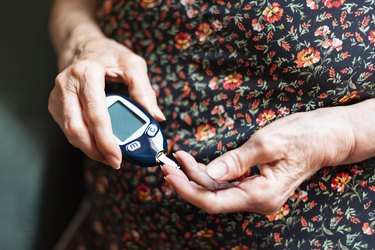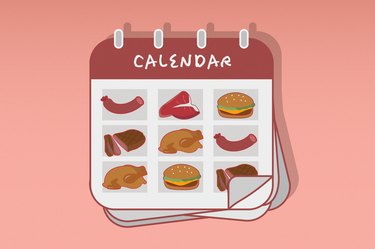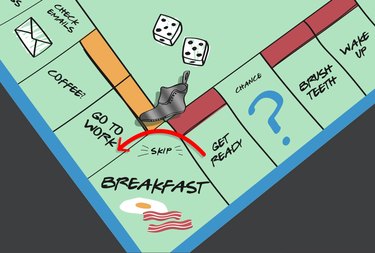
Fast food has a bad rap for being high in saturated fat, sodium and sugar. And while those things are generally true, there's a place for fast food in a healthy, balanced diet. Many fast food restaurants offer more nutritious choices, including salads, vegetable and bean sides and grilled options versus fried.
"If we look at one isolated eating occasion, even if it's every day, like eating an Egg McMuffin sandwich, it's no worse than eating something at Starbucks, for instance. If your lunch and dinner have a balance of produce or you're getting them in other ways during the day, then that's fantastic," says Nicole Rodriguez, RDN, dietitian and co-founder of Step Bite Step.
Video of the Day
Video of the Day
That said, eating fast food daily can pose several health risks if your overall diet doesn't include enough vegetables, fruits, lean protein, whole grains and healthy fats. It's about looking at the bigger picture of your diet and making sure you're consuming a variety of foods to get the nutrients and vitamins your body needs.
"Fast food is made to be a convenient, quick and inexpensive meal for people on the go. But it turns out that many people are now using fast food the same way we use sit-down restaurants — not just as a quick 'sometimes' meal," says Rachel Gargano, RD, dietitian at Top Nutrition Coaching.
About 37 percent of adults consumed fast food on a given day, according to an October 2018 survey commissioned by the Centers for Disease Control and Prevention (CDC).
"The problem is that the fast food industry purposefully makes fast food highly palatable, packing it with salt, fat and sugar, along with powerfully delicious smells to keep us coming back for more," Gargano says. "It's true that the industry is trying to offer healthier options, but even many of these can be laden with fat, salt and sugar without us realizing it. This can make it tough to make good choices when eating at a fast-food joint."
Here, we break down the effects of eating fast food every day — plus share dietitian-approved menu picks at popular drive-thrus to help you make healthier choices.
3 Major Health Risks of Eating Fast Food Every Day
1. You May Jeopardize Your Heart Health
Because most fast food — even healthier options — have higher amounts of sodium and saturated fat, eating fast food every day, especially fried foods, can negatively impact your heart health.
"Recent studies show that eating fast food even just one time per week can increase your risk for heart disease," Gargano says.
According to a July 2012 study in Circulation, people who consumed fast food at least twice a week increased their risk of dying from coronary heart disease by 56 percent compared to people who didn't eat fast food.
"With such high amounts of sodium, saturated fat and trans fats, it can not only increase your risk for developing high blood pressure but also create damage and blockages in your arteries that can lead to cardiovascular disease," Gargano says.
Plus many fast foods tend to be fried, and eating at least one serving of fried food every day is associated with a higher risk of all-cause and cardiovascular mortality in postmenopausal women, according to a January 2019 study in BMJ.
FYI, the Food and Drug Administration banned trans fats in processed foods in June 2018, but pan-frying meat can lead to the formation of cancer-causing heterocyclic aromatic amines (HCAs) due to high cooking temperatures, according to the National Cancer Institute.
Having extra sodium in your bloodstream increases the volume of blood inside your blood vessels, and therefore, hikes up your blood pressure, according to the American Heart Association (AHA). This means that your heart has to work harder to pump blood throughout your body.
To help reduce your risk of hypertension, you should have no more than 2,300 milligrams of sodium daily, with an ideal limit of 1,500 milligrams, per the AHA.
Some ways you can reduce sodium from your diet when ordering fast food are to choose grilled options versus fried, pick smaller portion sizes and ask for dressing on the side or in a packet instead of going for prepared salads, says Bonnie Taub-Dix, RDN, founder of BetterThanDieting.com and author of Read It Before You Eat It: Taking You From Label to Table.
It's also important to keep in mind the balance of sodium and potassium in your diet, Rodriguez says.
"Fast foods are not the only ones that tend to be a bit higher in sodium. Some foods that are high in sodium boast other health and convenience benefits, so it's important to examine the entire nutrition facts panel whether you're dining out or eating in," she says.
For example, foods like canned tuna, soups and sandwiches can be high in sodium but aren't considered fast foods. So make sure to evaluate the sodium content in your overall diet, not just in the fast foods you consume.
2. You Increase Your Risk of Developing Type 2 Diabetes
Although many salad dressings, sauces and dips at fast-food joints also have added sugar, the greatest sources of sugar are from sodas and other sweet drinks, as well as desserts, Taub-Dix says.
So if you're trying to watch your blood sugar levels, choose water as your drink and enjoy desserts in moderation. The same July 2012 study in Circulation found that those who ate fast food twice a week or more increased their risk of developing type 2 diabetes by 27 percent.
"The industry aims to make fast food easy to eat. This means less chewing, less fiber and more fat. If you can eat it faster, that means you'll eat it more. But this means using a lot of simple carbs that don't take much for you to chew and break down," Gargano says.
"The faster carbs break down, the faster they raise your blood sugar and insulin levels. Research has shown that many spikes in blood sugar and insulin throughout the day is a major contributor to the development of many chronic diseases."
Diets high in added sugar are associated with the development of cardiovascular disease and type 2 diabetes, as well as weight gain, according to a September 205 review in Critical Reviews in Clinical Laboratory Sciences.
Moreover, an April 2014 study in JAMA Internal Medicine found that those who consumed 17 to 21 percent of calories from added sugar had a 38 percent higher risk of dying from cardiovascular disease. That's why AHA recommends men limit their daily added sugar intake to 36 grams and 25 grams for women — no more than 6 percent of their daily calories.
Again, it's important to note where your added sugars are coming from, and it might not just be from the foods you pick up at the drive-thru. You should also consider the foods and drinks you order at fast-casual restaurants that offer sugary drinks, desserts and other sweet treats.
"Choosing the blueberry muffin at Starbucks every day is going to impact your blood sugar just the same as choosing the one at McDonald's. No one is telling you to consume a McFlurry or large Frosty every day, but it's also important to consider the overall context. Just because an item came through a window at a drive-thru, it doesn't make it inherently worse than a pricier equivalent with a similar nutritional profile," Rodriguez says.
3. Your Gut Health May Take a Hit
Unless you're ordering a veggie or bean side dish or a salad, you're most likely not to get much in the way of fiber in your fast-food meal. Fiber is not only important for keeping you regular, but it helps you stay satisfied for longer periods of time because it balances your blood sugar levels.
"Fiber is important to help keep the colonies of good-for-us bacteria thriving and may even help prevent the growth of disease-causing bacteria. If you're not someone who makes vegetables on a regular basis, then choosing fast-food options that include vegetables could help you bridge this gap and help promote better gut health," Gargano says.
Just remember to limit creamy dressings and fried foods from your diet because eating too many foods high in saturated fat can negatively impact your gut health, she adds.
According to a small July 2021 study in Diabetes Care, participants who consumed fried meat four times a week had less microbial diversity in the gut compared to those who didn't eat fried meat.
In addition, fried foods can be harder to digest, which can affect your sleep, especially if you're eating late at night, Taub-Dix says.
If you enjoy fast food daily, Rodriguez recommends making sure you're consuming plenty of vegetables, fruits and beans and legumes to help balance things out.
3 Healthy Ways to Enjoy Fast Food
There's no harm in enjoying a burger and fries every now and then, but if you're eating fast food every day, here are some ways you can cut down the saturated fat, sodium and sugar from your diet.
1. Introduce Healthier Options With Your Favorites
If you enjoy fast food daily, you can use the meals you love as gateways to introducing healthier foods into your diet. For example, if you like Taco Bell's Cheesy Gordita Crunch, you can have it with a side of black beans, which provide health-boosting fiber, Rodriguez says.
"If they have the bandwidth, maybe after a couple of tries, they can purchase canned beans and use them in a meal at home. Something I love about fast food is that it is not only familiar but can help build familiarity with new, nutrient-dense foods in a safe space," Rodriguez says.
2. Choose Smaller Portion Sizes
Instead of ordering large or super-sized versions of the meals you like, go for petite portions. For example, enjoy a small order of fries with your burger, Taub-Dix says.
She also notes that wraps tend to be smaller in size than sandwiches and burgers. "They may not always have the healthiest ingredients but at least they are small and have ingredients that you enjoy. Although super-sizing might be less costly money-wise, they are costly health-wise."
The same principle applies to drinks and desserts. If you're craving a frozen treat or want to have a Coke with your meal, go short.
3. Consider Fish or Chicken
Fish and chicken dishes tend to have less saturated fat than meat items on the menu. If you choose fish or chicken, make sure to order them grilled versus fried, Taub-Dix says.
Although many of the grilled variations of fish and chicken dishes are still high in sodium, they may have less fat and lower salt content than their fried counterparts. Check out fast-food menus online before making your trip so you can make the healthiest choice possible.
Dietitian-Approved Fast-Food Menu Picks
McDonald's | Wendy's | Chick-fil-A | Taco Bell |
|---|---|---|---|
Egg McMuffin (Order without the bacon to reduce fat and sodium content) | Parmesan Caesar Salad (leave off Parmesan crisps) | Chick-n-Minis | Crunchy or soft Tacos With Black Beans, Lettuce and Cheese |
Happy Meal | Sour Cream and Chive Baked Potato | Greek Yogurt Parfait | Power Menu Bowl (Order without the rice and ask for extra beans) |
Grilled Chicken Salad With Balsamic Vinaigrette | Grilled Nuggets |
So, How Bad Is It Really to Eat Fast Food Every Day?
Eating fast food daily might not be so bad if you're ordering smaller dishes on the menu that are lower in saturated fat, sodium and sugar and are balancing your meal with lots of vegetables, fruits, healthy fats and lean protein throughout the day. Including a range of healthy foods in your daily meals can help ensure that you're getting the nutrients your body needs.
"It's not bad if you're ordering healthier versions and not having soda or dessert. The biggest offender is the sodium content, so just choose fresher foods for your other two meals. Take into consideration what you're having the rest of the day," Taub-Dix says.
If you're relying on fast food for its convenience, you might also want to consider healthy foods that you can quickly and easily prepare at home. For instance, tuna sandwiches and salad kits are speedy and healthy meals you can throw together.
"In a perfect world, we'd all have endless time, limitless bandwidth and patience to create every meal at home. Personally, I don't want to live in that world and advise my clients to throw out the idea of 'perfection' and lean into reality. Busy people are lucky to have fast food and can do so as they see fit as part of an overall balanced diet," Rodriguez says.
But if you have goals to improve your health and manage certain conditions, limiting your fast food intake is a smart move.
"If you're really looking to improve your health and longevity, I recommend keeping it to once per week, or even just twice per month. If you go a few times per week, make weekly goals to eat fast food less and less. A slow transition like this builds longer-lasting healthy habits," Gargano says. "Making foods at home and keeping your diet rich in vegetables, fruit, beans and nuts and seeds can vastly improve your health and help prevent the development of chronic diseases."
- American Heart Association: "How Much Sodium Should I Eat Per Day?"
- American Heart Association: "How Does Sodium Affect My Heart?"
- Centers for Disease Control and Prevention: "Fast Food Consumption Among Adults in the United States, 2013–2016"
- Journal of American Heart Association: "Association of Fast‐Food and Full‐Service Restaurant Densities With Mortality From Cardiovascular Disease and Stroke, and the Prevalence of Diabetes Mellitus"
- Circulation: "Western-Style Fast Food Intake and Cardiometabolic Risk in an Eastern Country"
- Critical Reviews in Clinical Laboratory Sciences: "Sugar Consumption, Metabolic Disease and Obesity: The State of the Controversy"
- American Heart Association: "Added Sugar Intake and Cardiovascular Diseases Mortality Among US Adults"
- JAMA Internal Medicine: "Added Sugar Intake and Cardiovascular Diseases Mortality Among US Adults"
- Digestive Care: "The Association of Fried Meat Consumption With the Gut Microbiota and Fecal Metabolites and Its Impact on Glucose Homoeostasis, Intestinal Endotoxin Levels, and Systemic Inflammation: A Randomized Controlled-Feeding Trial"
- Food and Drug Administration: "Trans Fats"
- National Cancer Institute: "Chemicals in Meat Cooked at High Temperatures and Cancer Risk"
- BMJ: "Association of Fried Food Consumption With All Cause, Cardiovascular, and Cancer Mortality: Prospective Cohort Study"












